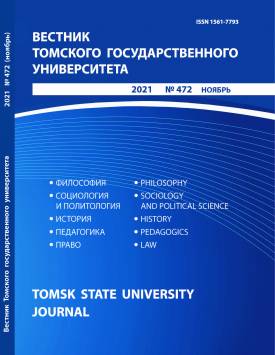Technological Threat and Risk of Being
This article poses the problem of the influence of technological progress on the way of human existence. The development of modern technologies, according to some forecasts, may lead to the “replacement” and/or “displacement” of a person from reality. Such a forecast forces us to take a fresh look at the general problem of technology as an “anthropological threat”. It cannot be said that a technical device as such physically threatens a person. Moreover, the progress of technology represents itself precisely in the fact that technical devices are becoming not only more and more complex, but also more and more safe for humans. We should talk about an existential threat, that is, about the danger that awaits humanity as an intelligent form of life on the way of realizing its existence. Therefore, the problem may lie in the fact that technique/technology is capable of completely ousting a person from the history of the world. The cognitive context of research is given by the critical analysis of the concept of risk. I show that risk is a key factor in being human because one acts as a free and responsible being. Reducing the level of risk (that is, improving the level of safety) is directly related to the reduction of human existence to the sum of quantifiable data. It is this trend that leads to the “domination of technology over man” and to the abandonment of freedom/responsibility in favor of “smart” technologies. This perspective of the development of events can be corrected with the help of a humanitarian examination of technical progress. The methodology of such a correction can be built on the basis of the approach demonstrated by Martin Heidegger in his reports devoted to the analysis of the essence of modern technique. Heidegger showed that the technical approach to reality simplifies being to the level of the world “at disposal”. Heidegger calls the principle of such an ontological reduction by the term “Gestell”. By focusing on Gestell, a person renounces their mission, loses their freedom and existential identity. However, even in this situation, humanity has hope for the restoration of the fullness of being and liberation from reductionism. This requires, if we recall the ethics of Spinoza, not to allow the transformation of fear into despair, and hope into safety. As long as the fear of possible threats contains uncertainty and, therefore, has hope as its reverse side, a person has the opportunity to change the state of affairs. A person will never be defeated by a technology/program if they doe not agree to reduce themselves to the level of an “intelligent machine” or information model. Consequently, the problems of modern technologies can be adequately formulated and correctly solved only in the field of anthropology.
Keywords
smart technologies, technique, risk, existence, philosophical anthropologyAuthors
| Name | Organization | |
| Avanesov Sergey S. | Yaroslav-the-Wise Novgorod State University | iskiteam@yandex.ru |
References

Technological Threat and Risk of Being | Vestnik Tomskogo gosudarstvennogo universiteta – Tomsk State University Journal. 2021. № 472. DOI: 10.17223/15617793/472/1
